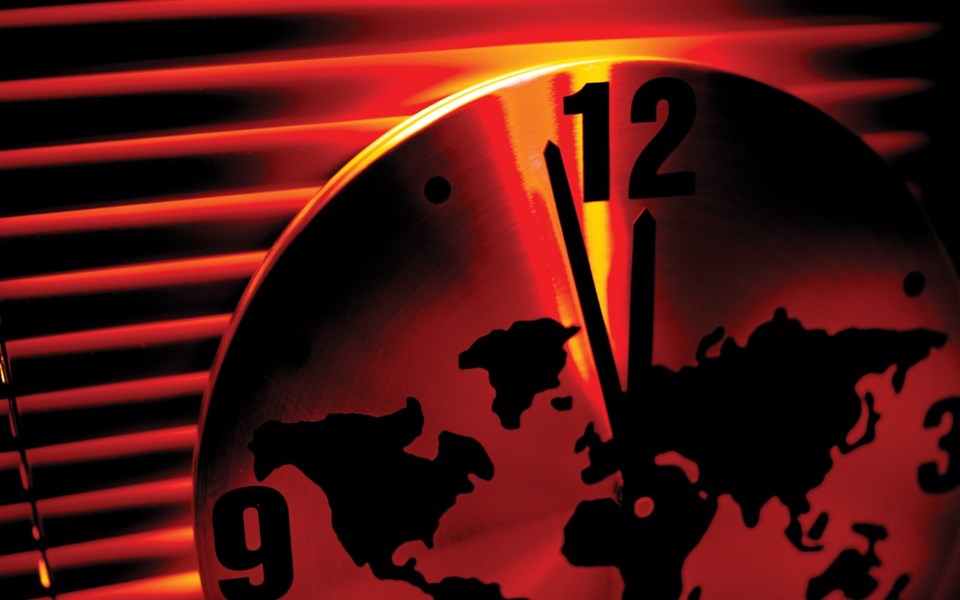It's not often you get a second warning in really dodgy situations, especially when you're already on shaky ground.
But we've just gotten one that's come, appropriately, in the midst of one of the most important conferences on climate change: The UN's COP 23 in Bonn, where, as I write this, world leaders are turning the Paris Accord into action to reduce carbon emissions worldwide. Yes, there's even a representative there from the U.S., despite the fact it's the only country on Earth not part of the Paris agreement now that Syria and Nicaragua have signed on, giving them the catchy new slogan, "America Last!"
And this powerful second warning reaches even beyond climate change: 15,364 scientists in 184 countries from a variety of disciplines — economics, medicine, ecology, you name it — have signed the "World Scientists' Warning to Humanity: A Second Notice."
The full warning, along with doable suggestions for heeding it, is a potent essay that will take you six minutes to read. It's from the Alliance of World Scientists, (view at: scientistswarning.forestry.oregonstate.edu), a collective group of international scientists that's independent from governments, corporations and, surprisingly, NGOs.
The team of eight original authors is headed by Bill Ripple, a distinguished professor of ecology at Oregon State University known for his work on trophic cascades and grey wolves. For years, Dr. Ripple has also been advocating to reduce the number of ruminants like cattle in our food supply system because of the methane and nitrous oxides they release.
Animal farts contain gasses that, pound-for-pound, trap far more heat than carbon dioxide does and need to be reduced along with fossil fuels. But that's only one smallish factor in the warning. (Suggested fix: Simply eat less animal protein. Another simple, food-related solution: Reduce food waste, in our fridges and throughout the supply chain.)
The bigger warning bell is being tolled about increasingly alarming trends around agriculture, population growth, deforestation, fresh water supplies, increasing greenhouse gases and pollution, ecosystem destruction, unleashing the sixth mass extinction, and more — all against the backdrop of 40 per cent population growth by about 2040 as predicted by the UN.
Alarmingly, improving the ozone layer is the only thing we've gotten right since the first "World Scientists' Warning to Humanity" was issued in 1992 by the Union of Concerned Scientists and more than 1,700 other scientists, who warned us back then we were already pushing Earth's ecosystems beyond their capacity to support the web of life. (For context, in 1992 Reservoir Dogs and Wayne's World were top movies, Whistler was enjoying its first honours as top North American ski resort, Bob and Kathy Barnett hadn't even started Pique yet, and the world had 2 billion fewer people.)
So why this second warning now?
"To prevent widespread misery and catastrophic biodiversity loss, humanity must practice a more environmentally sustainable alternative to business as usual. This prescription was well articulated by the world's leading scientists 25 years ago, but in most respects, we have not heeded their warning. Soon it will be too late to shift course away from our failing trajectory, and time is running out. We must recognize, in our day- to-day lives and in our governing institutions, that Earth with all its life is our only home," stated the alliance on its website.
So our inaction has pushed us ever closer to the Doomsday line.
Meanwhile, on the climate front, we have consensus that climate change is human-caused. Ninety-seven per cent of scientists — make that 97.2 per cent, to be exact — acknowledge that people are causing the huge changes in climate we've seen since the middle of last century. (2016 was the warmest year on record; 2017 is set to be one of the three hottest years.)
After first being reported last year, the "97 per cent" factor is getting even more traction lately, and I'm sure you can guess why.
We can thank a team of scientists and other experts for it who blog at the cheekily-named Skeptical Science at skepticalscience.com. (Tagline: "Getting skeptical about global warming skepticism.") They analyzed 4,000-plus abstracts on climate change and concluded that 97 per cent assumed people play a role in climate change. It's this kind of work that's won Skeptical Science the Australian Museum's 2011 Eureka Prize for the advancement of climate change knowledge.
If you want more info on what's happening at the U.N. level, Skeptical Science members have also been blogging about COP 23 and the Paris Accord. They've also got excellent graphics, like a barometer of the most-used climate myths, including my favourite — climate change is not bad, because good things will happen, like you could grow crops in the Arctic!
First, even if the Arctic warmed enough to be productive, soil in such areas is really poor. Also, growing any crops or raising any animals demands reliable sources of water and we're already seeing how climate change is increasing droughts and flooding, just as scientists predicted. Then there's the acidification of our oceans due to carbon emissions, while per capita fish consumption has nearly doubled since the 1960s.
But, please, don't take my word for it — check for yourself and see if 15,000 scientists, and the 97 per cent factor might be wrong.
In the meantime, you might want to try going meatless one meal a week, say; stop wasting food; and support leaders who heed this dark and timely warning.
This is last call.
Glenda Bartosh is an award-winning journalist who trusts science.




